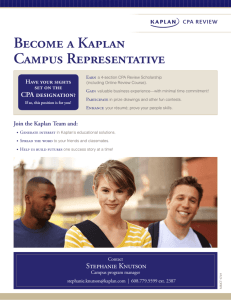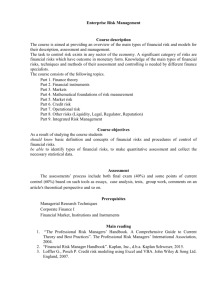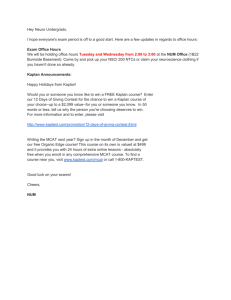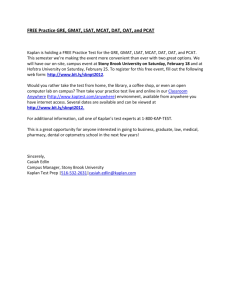External regulation of business
advertisement
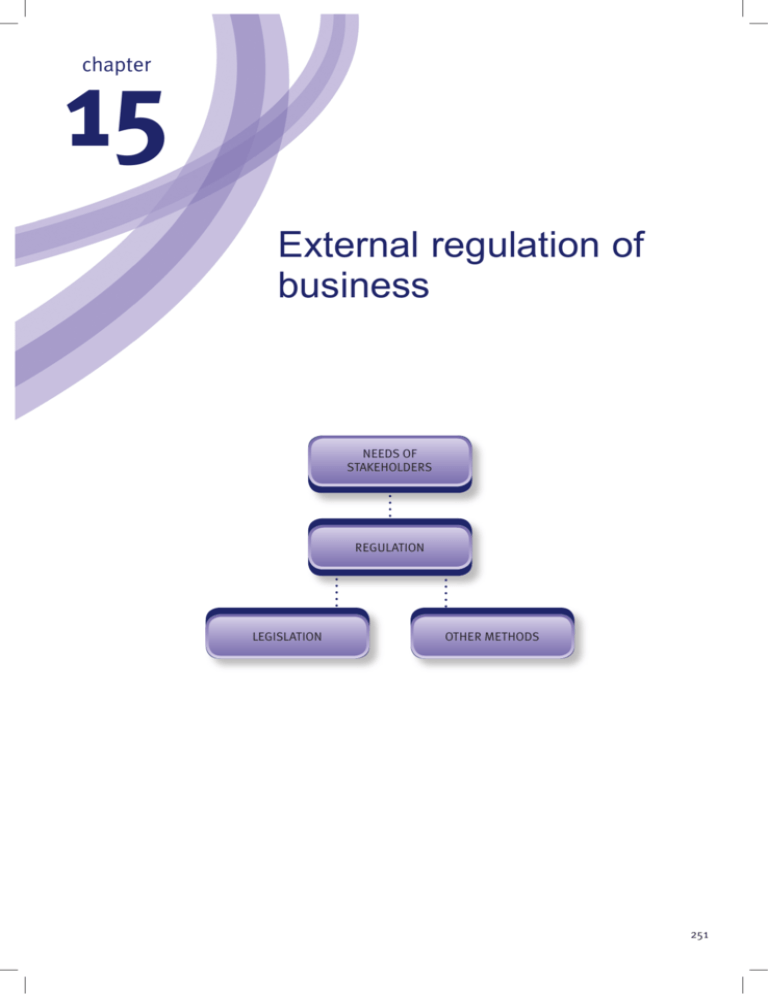
15 chapter External regulation of business Needs of stakeholders Regulation Legislation Other methods 251 External regulation of business 1 The needs and impact of stakeholders Stakeholder Needs Shareholders Profits, to h share price. Employees Suppliers Customers Local community • 252 Issues Directors may be serving own needs. Directors may be paying themselves too much. Poor decisions could risk corporate failure. Solutions Corporate governance rules and legislation. Job security, Corporate fair wage, governance rules safe working and disclosures, conditions, fair Health and employment Safety legislation, practices. etc. Sex/Race Discrimination legislation. Prompt payment. Company may be Access to insolvent. audited financial statements, insolvent trading legislation. Continued Company may Financial supply, ethically- become insolvent. statements, social/ produced goods. environmental legislation and disclosure. Jobs, safety Emphasis on Employment (transport, profits could lead protection emissions, etc.) to other needs legislation, being ignored. environmental protection, etc. Corporate governance, etc. covered elsewhere. This section concentrates on regulation by legislation. kaplan publishing chapter 15 Illustration 1 – The needs and impact of stakeholders Tasty Biscuits Limited produces biscuits in its factory in Liverpool. List four safety issues that could affect stakeholders and the areas of legislation/regulation that would regulate them. Issue Area of regulation Delivery lorries may be unsafe, e.g. faulty brakes. Road transport, e.g. MOT, safety inspections. Butter and other ingredients may be stored at incorrect temperatures. Food safety regulations. Factory machinery may be unsafe, e.g. no guard rails on cutting machines. Factories Act etc., Health and Safety legislation. Temperature in factory may be too high/low. Health and Safety. Test your understanding 1 Classy Coffee Limited imports and distributes organic coffee. List 5 specific stakeholders and the areas with which they would be concerned. Stakeholder Area of concern 1 2 3 4 5 2 Effects of regulation upon business 2.1 Addressing market failure Regulation appropriate where: • imperfect competition, e.g. monopoly kaplan publishing 253 External regulation of business • externalities, e.g. reducing pollution, banning smoking • imperfect information, e.g. improving quality standards • equity, to improve social justice, e.g. sex discrimination legislation. 2.2 Protecting public interests • To ensure that needs of stakeholders other than shareholders are met (see above). Regulation may: • increase or reduce the social standing of various social groups • promote the collective desires of a significant section of society • enhance opportunities for the formation of diverse preferences and beliefs in society • affect the development of particular preferences across society as a whole • deal with the problem of irreversibility (current activities will result in outcomes from which future generations may not recover) e.g. global warming. 2.3 Examples of regulation/regulatory bodies 2.3.1European Union (EU) • EU regulations – obligatory in all member states, overrule UK law. • EU directives – must be incorporated into national law to become effective. 2.3.2 Environment Protection Agency (EPA) • Oversees environmental regulation. 2.3.3Competition regulators 254 • Office of Fair Trading (OFT) – investigates those suspected of breaching Competition Act (e.g. price fixing, cartels, abusing a dominant position). • Competition Commission – independent body which conducts enquiries into mergers, takeovers, etc. • Takeover Panel – Part of Competition Commission. Enforces City Code on Takeovers and Mergers for listed companies. kaplan publishing chapter 15 Illustration 2 – Effects of regulation upon business A, B and C are three companies in the oil industry. A complaint has been made to the OFT that these three companies have been operating a cartel and colluding on prices. List the impacts on the businesses. • OFT officials can enter premises and demand relevant documents to establish whether prices have been fixed. • If proven, the fine can be up to 10% of annual worldwide revenue. • Third parties may be able to claim for damages from the business if it has been found to breach any of the prohibitions. • There will be adverse publicity. • Competition Disqualification Orders may be made against the directors. • The share price may be adversely affected. Test your understanding 2 Give three examples of matters that might be deemed anticompetitive. 1 2 3 kaplan publishing 255 External regulation of business 3 Key international legislation 3.1 Why the need for international regulation? Globalisation g companies operating in many different countries g requirement for international regulation. Advantages of international trade: • Efficient allocation of resources – countries specialise in what they’re good at. • Can transfer raw materials from those with surplus to those with deficit. • Increased competition from new competitors g increased efficiency. • Larger markets g economies of scale. • Trading links g closer political links. 3.2 Regulations to encourage free trade 3.2.1Barriers to international trade: • Tariffs or customs duties. • Import quotas/embargoes. • Hidden subsidies/import restrictions. 3.2.2Free trade bodies • World Trade Organisation (WTO) – set up in 1995 to promote free trade, remove barriers. • EU – intended to operate a single European market, to allow free movement of labour, goods and services, and free competition. • Other regional trading organisations, such as NAFTA (USA, Canada, Mexico) and ASEAN (South East Asia). 3.3 Sarbanes-Oxley Act 2002 (Sarbox) 3.3.1Background Enron, WorldCom, other corporate scandals g concern about corporate responsibility, internal controls, financial reporting, role of auditor. 3.3.2International implications Overseas companies who are part of group listed on IS stock exchange must comply. 256 kaplan publishing chapter 15 3.3.3Main provisions Auditor independence Auditors are restricted in the additional services they can provide to an audit client. US stock exchange regulations Required under the Act – very similar to UK regulations. Audit committee Company must have an audit committee – will be disallowed from trading if does not have one. Sarbanes-Oxley Act Key points Internal control report Annual report must include statements concerning the internal control systems in the company. Increased financial disclosures Financial reports to detail off-balance sheet financing. Measures introduced by the Act include: • All companies with a listing for their shares in the US must provide a signed certificate to the Securities and Exchange Commission vouching for the accuracy of their financial statements. • If a company’s financial statements are re-stated due to material non-compliance with accounting rules and standards, the chief executive officer and chief finance officer must give up bonuses awarded in the previous 12 months. • Restrictions have been placed on the type of non-audit work that can be performed for a company by its firm of auditors. • The senior audit partner working on a client’s audit must be changed at least every five years (i.e. audit partner rotation is compulsory). • An independent five-man board called the Public Company Oversight Board has been established, with responsibilities for enforcing professional standards in accounting and auditing. • Regulations on the disclosure of off-balance sheet transactions have been tightened up. • Directors are prohibited from dealing in the shares of their company at ‘sensitive times’. kaplan publishing 257 External regulation of business Key effects of the Sarbox legislation are: • Enforcement: - Sarbox takes a robust legislative approach which sets out clear personal responsibility for some company directors with a series of criminal offences that are punishable by fines (both company and its officers) or lengthy jail sentences. • Documentation: – Sarbox creates a much more rigorous demand for evidencing internal controls and having them audited. Illustration 3 – Key international legislation You are advising the director of XYZ Limited, a 100% subsidiary of XYZ Inc, which is listed on the New York Stock Exchange. Explain the impact of Sarbox on XYZ Limited. As XYZ Limited is the subsidiary of a listed group the Sarbox Rules apply. XYZ Limited should have a comprehensive external audit by a Sarbox-compliance specialist to identify areas of risk. Specialised software should be installed to provide electronic paper trails necessary to ensure Sarbox compliance. 258 kaplan publishing chapter 15 Test your understanding 3 Decide whether the following Sarbox provisions are true or false. Provision True/False Auditors of a company are restricted in the type of non-audit work they can do for them. Senior audit partner working on a client’s audit must be changed every 5 years. All main board directors must have a university degree. Directors are prohibited from dealing in their company’s shares at ‘sensitive times’. A company must change its auditors every 6 years. Bonuses must not be paid to the chief executive and chief financial officer until 12 months after the company’s year end. Bonuses to the chief executive officer and chief financial officer awarded in the previous 12 months must be given back if a company’s financial statements are re-stated due to material noncompliance with accounting rules and standards. All companies with a listing for their shares in the US must provide a signed certificate to the Securities and Exchange Commission vouching for the accuracy of their financial statements. kaplan publishing 259 External regulation of business Chapter summary Needs of stakeholders: Shareholders Customers Suppliers Employees Local community. Regulation: Reasons for regulation Regulatory bodies. Legislation: International regulatory bodies Sarbanes-Oxley. 260 Other methods: Covered in other sections. kaplan publishing chapter 15 Test your understanding answers Test your understanding 1 Stakeholder Area of concern 1 Customers Ensuring that coffee is genuinely organic and not contaminated. 2 Suppliers Ensuring that a fair price is paid. 3 Employees Ensuring that a fair wage is paid. 4 Shareholders Ensuring that the company makes a high profit while considering the needs of the environment, etc. 5 Local community Ensuring that deliveries, etc take place with minimum disruption. Test your understanding 2 1 Two accounting firms merge, and the merged firm has a market share of 50%. This would be deemed to be a dominant position, and the merger may be banned in order to prevent abuse. 2 Two construction companies (A and B) are each bidding for the same two contracts (X and Y). They agree that A will bid high on contract Y and B will bid high on contract X so that both will be successful on one bid (A on X and B on Y). 3 Two supermarkets agree to fix the price of certain goods at an agreed level and to avoid competing on price. kaplan publishing 261 External regulation of business Test your understanding 3 Provision True/False Auditors of a company are restricted in the type of non-audit work they can do for them. True Senior audit partner working on a client’s audit must True be changed every 5 years. 262 All main board directors must have a university degree. False Directors are prohibited from dealing in their company’s shares at ‘sensitive times’. True A company must change its auditors every 6 years. False Bonuses must not be paid to the chief executive and chief financial officer until 12 months after the company’s year end. False Bonuses to the chief executive officer and chief financial officer awarded in the previous 12 months must be given back if a company’s financial statements are re-stated due to material noncompliance with accounting rules and standards. True All companies with a listing for their shares in the US must provide a signed certificate to the Securities and Exchange Commission vouching for the accuracy of their financial statements. True kaplan publishing


